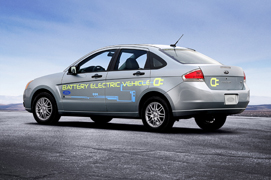At least 40 battery-based vehicles will make their debut between now and 2012, according to a new study by PriceWaterhouse Coopers. And the rate of new offerings could increase significantly in the years beyond.
But the report cautions that the technology “is not expected to have a major volume impact in the near to mid-term,” in part “because the price premiums” for the technology “are prohibitive.”
The timing of the PWC report coincides with the opening of “The Business of Plugging In,” a conference designed to spur the development of plug-in hybrid technology. (Click Here for the full story.) General Motors is planning to launch its much-heralded Chevrolet Volt in about a year, with Toyota, Ford and a number of other makers plnning their own plug-ins, as well. Ford is one of many manufacturers spreading its bets across a variety of green technologies; the maker plans to bring out pure battery-electric versions of its Transit Connect van and Focus sedan by 2012, as well.
“The vehicle electrification phenomenon has boldly taken center stage,” says the PWC report. “But calculating real demand and gauging the time needed for EVs to become mainstream remains contingent on several core drivers, including environmental impact, infrastructure development and government support.”
The price of gasoline, going forward, is generally considered another key issue. At current pump prices, industry observers warn it would be difficult to make the case to consumers that they should spend thousands more for vehicles like Volt or the Focus EV.
The lack of a nationwide charging infrastructure is a particularly serious roadblock for pure battery vehicles, as consumers express serious “range anxiety” about electric propulsion. Plug-ins should help mitigate that somewhat, says the report, since a product like Volt can simply switch to gas power when its batteries run down.
The PWC study cautions that battery power is not necessarily the ultimate solution to automotive emissions. The nation is still dependent on “dirty” coal and petroleum for much of its electric generation capacity, so, “While an EV may emit less pollution than its petrol-powered equivalent, the energy source from which its electricity is derived could offset any material gains.”
Though automakers, suppliers and energy providers are all pitching in to support the transition, the PWC report stresses that “despite substantial private investment…continued government support will be required.”
But the report concludes that the movement is clearly underway, and while it may take some time before electric power supplants petroleum, battery technology is moving from the fringe to the mainstream.

